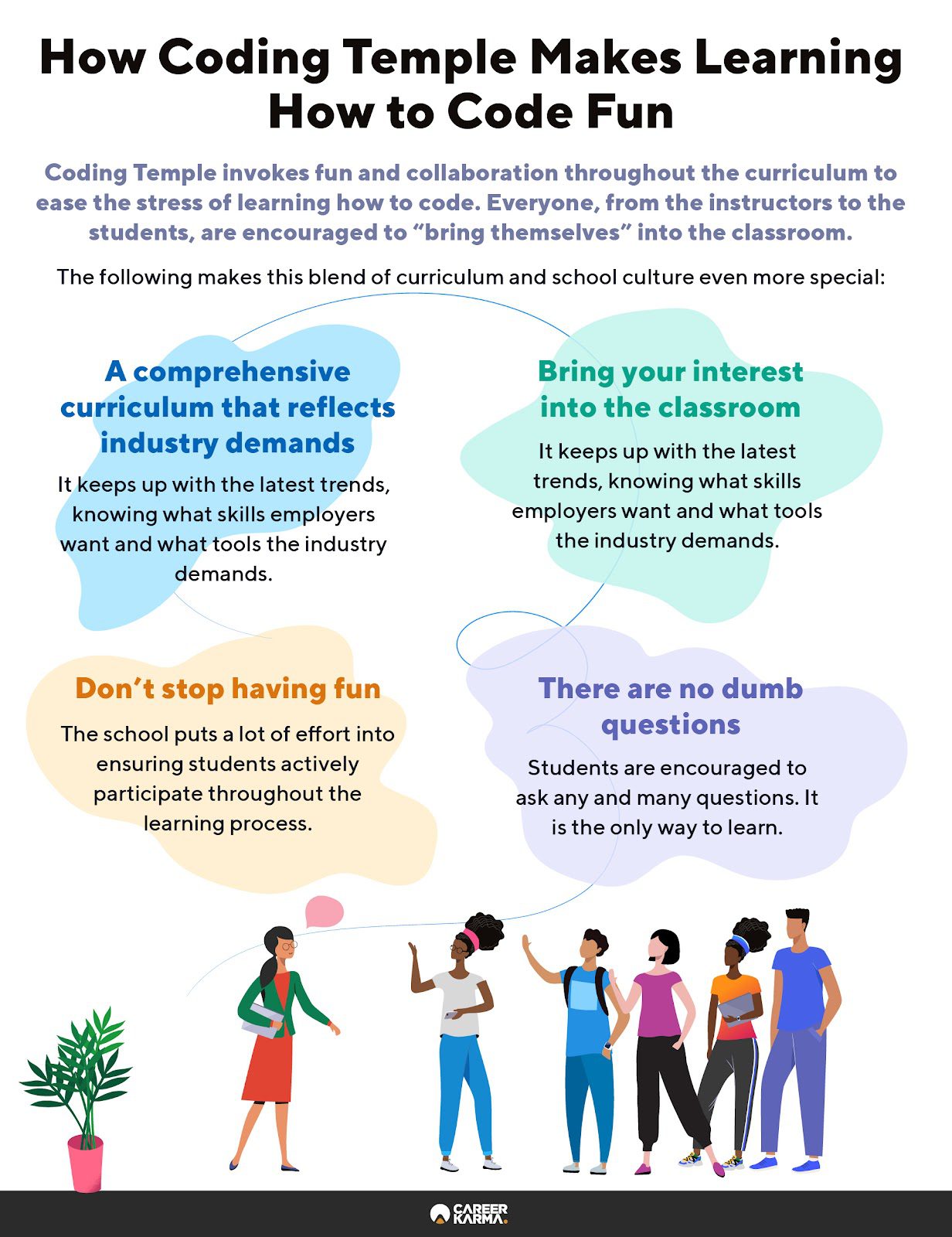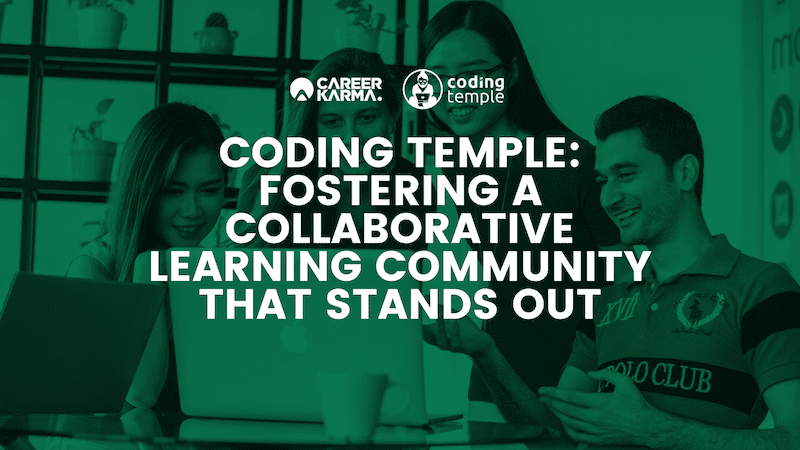School culture plays a crucial role in a student’s learning experience. An article on the Harvard Graduate School of Education website highlighted how a school’s culture is created and fostered.
It read: “In a strong culture, there are many overlapping and cohesive interactions among all members of the organization. As a result, knowledge about the organization’s distinctive character—and what it takes to thrive in it—is widely spread and reinforced.”
In other words, strong school culture is determined by how members of the school, from its instructors to coaches and students, interact with each other. The way they interact with each other and how often it happens shapes and strengthens a school culture.
Coding Temple takes pride in its school culture, which aims to be open and welcoming. This is demonstrated in how instructors are invited to bring their interests into the classroom, how students are given opportunities to collaborate, and the innovative ways it keeps its courses up-to-date. The coding bootcamp constantly ensures cohesive interactions are created among its members to maintain the unique culture.
Coding Temple creates a unique school culture that welcomes a diverse pool of instructors and learners.
Apply to Coding Temple today.The Coding Temple Difference

Coding Temple’s curriculum and culture work together to transform students into successful programmers. To welcome a diverse pool of learners, Coding Temple offers various payment plans and financing options, including zero-percent interest monthly payments.
The coding bootcamp consists of a 10-week full-time hands-on full stack development program aimed at building a solid programming foundation. Classes feature whiteboard, classroom discussion, and technical quizzes, with a capstone project at the end. For students who are not able to attend full-time classes, Coding Temple offers a 12-week part-time full stack development course.
Throughout the program, students receive individual attention and mentoring from instructors, a career coach, and alumni support. By the end of the course, graduates would possess the necessary skills to create a complete web application, enabling them to kickstart their career in tech. Students will also have access to an expansive employer network that can help get their careers started.
To get an idea of Coding Temple’s unique make-up, Head of Curriculum Joel Carter shares his insights on why their curriculum and school culture stand out amongst other bootcamps, and how students benefit immensely from it.
Industry-Led Curriculum
Coding Temple’s curriculum covers the demands of the real-life software developer workplace. “We try to go as close to the real world as possible,” says Joel. “What we are fostering is full stack collaboration. For example, we start building in Python with the whole backend, databases, and APIs.”
This is followed by the backend team collaborating with the front end team. “We build the backend, give the data to the front end, and then use React to put all that together.”
To keep up with the latest trends in tech, the Coding Temple team always keeps their ears to the ground, brainstorming projects that “an employer would want to see.” “It comes down to ‘What is the industry saying?’ and ‘What’s around us?’ says Joel.
Instructors also play a crucial part in creating Coding Temple’s curriculum. The coding bootcamp takes the best that each instructor has to offer and channels them back to the program. “Our instructors have their own interests, and they bring this with them into the classroom. For example, we have a contest coming up where the instructors can build whatever they want,” Joel says.
They then integrate the top two projects into the curriculum. “It’s a healthy banter between instructors. They are free to explore and find other interesting new technologies. It all boils down to what people are [being] hired for and what we are going to have the most fun doing,” he remarks.
Fostering a Welcoming Community
Coding Temple is an open ground for new ideas. “In my case, I’m a big Power Rangers fan,” says Joel. “When I was an instructor, I brought that to the classroom. I tell all the instructors to bring themselves into the classroom. Our culture at Coding Temple is whatever you are into, whether it is anime, Power Rangers, gaming…just bring that to the classroom.”
This, he says, makes the course palatable to students as the program is not as “buttoned-up” as students might think it would be. It’s a relaxed culture, which then helps students enjoy learning and actively participate despite the rigor of the program. “They don’t have to worry about asking dumb questions because there are none,” stresses Joel.
In fact, students are encouraged to ask “whatever questions” as the school believes that there would be others who may have similar questions. Students who don’t feel comfortable with asking so openly can also approach any of the TAs and instructors.
“We want everyone to feel welcomed at the end of the day,” Joel says.
Making Fun a Priority
As coding bootcamps go, training is usually intensive and fast-paced. Because of this, it isn’t unheard of for students to struggle and thus fail to enjoy the learning experience. This is why Coding Temple puts a lot of effort into creating a learning environment that advances not just quality learning but also interactive and collaborative learning, from the assignments to the programming exercises.
Joel’s advice to students and programmers, in general, is to have fun—that being the biggest thing. “Generally, what we found is that the more fun students have in class, the more successful they become. If you have fun programming, this is the best place for you to be. If you’re not having fun, this will probably be a really hard uphill battle for you.”
Be Comfortable With Questions
From Day 1 of the program, students are taught to embrace mistakes in the classroom. “If you’re afraid to be wrong, that’s usually the time when you’re going to paralyze yourself,” Joel says.
He notes that the more questions students ask and become familiar with being uncomfortable, the better they can be as programmers. Why? Because the more you’re uncomfortable and lean into that discomfort, the easier it is for you to ask difficult questions, Joel explains.
And because of the open-door policy, that “lightbulb” moment can happen freer at any time.
“That’s the kind of success we’re looking for. By the end of 10 weeks, what we’re trying to make you better at is thinking through a problem that you’ve never seen before. The lightbulb moment is what we’re looking for most of the time…As a developer, the moment that you become paralyzed by the hard questions, that’s when you stagnate yourself as a developer, and that’s when it’s harder to learn new things,” Joel says, adding that he too practices this culture.
“In my day-to-day job, I have to answer questions that I’ve never seen before and come up with solutions that have never been created before. That comes from my pedigree as a developer. If you’re comfortable with that, you’ll be fine.”
Career-Ready Outcomes
Coding Temple’s curriculum and culture focus on creating work-ready developers armed with strong programming foundations that allow them to continue to grow in their field, long after they finish the program.
“[After graduation], they should be able to build a full stack project with Python on the backend and JavaScript, HTML, and CSS on the front end, whatever they want,” Joel says.
The school has had students building Chrome extensions and conducting health inspections on restaurants. “We had some other students who decided to explore the Spotify API a little more and come up with curated playlists based on some other song you requested before. There’s a gamut of things that people end up doing.”
These successful student outcomes are thanks to the combined strength of Coding Temple’s curriculum and school culture. Coding Temple puts conscious effort into creating a culture that teaches students how to be critical thinkers and encourages them to bring their unique abilities to their bootcamp experience.
If this fun and welcoming school culture sound right for you, apply to Coding Temple today.
About us: Career Karma is a platform designed to help job seekers find, research, and connect with job training programs to advance their careers. Learn about the CK publication.




